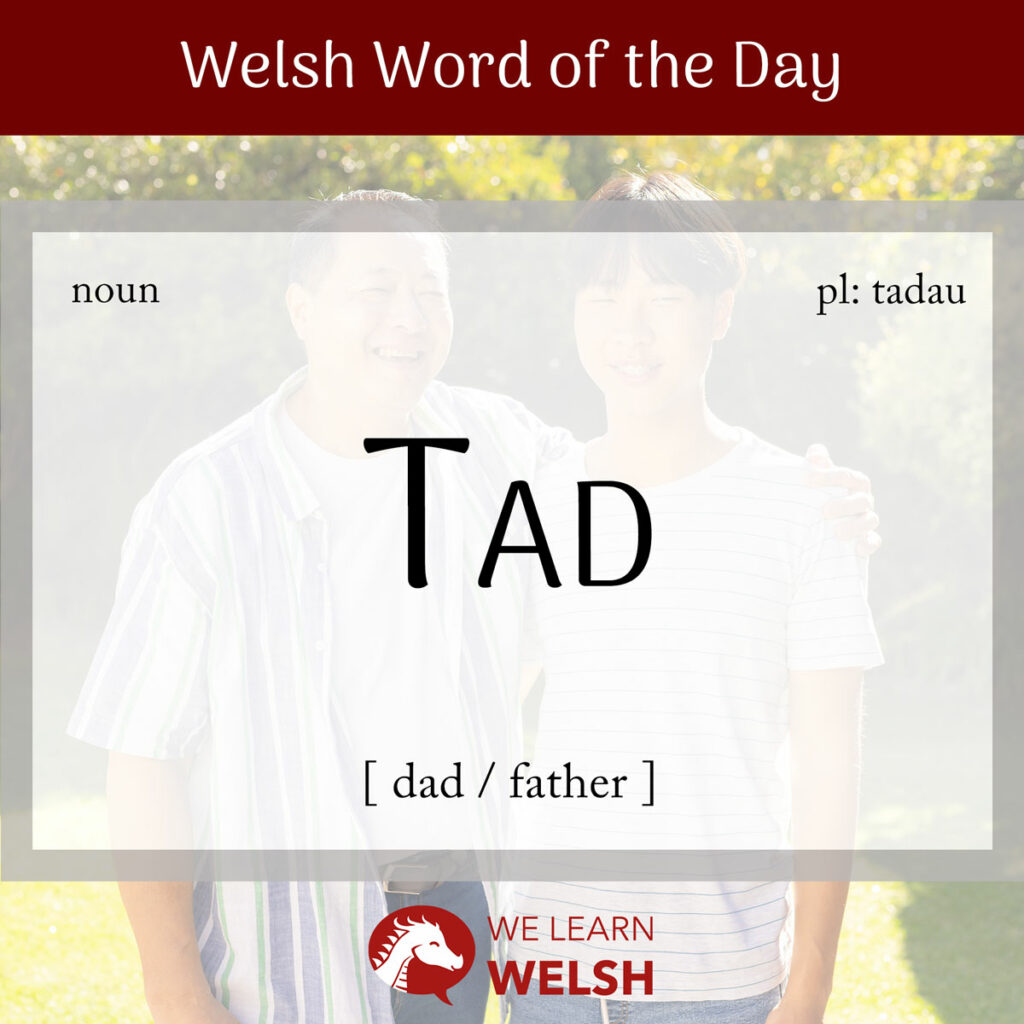Have you ever heard a Welsh person talking about giving something i Dad (to Dad), saying they couldn’t have done something heb Dad (without dad), or asking after dy dad (your dad)? If so, you’d be forgiven for thinking Welsh uses the same word as English, dad.
In actual fact, dad is a soft mutation of tad, the true Welsh word for a dad or a father. It’s a masculine noun, of course, and the plural form is tadau (dads).
tad
dad / father
tadau
dads / fathers
But that isn’t to say that there is no connection between English dad and Welsh tad. Unlike most words in English, the etymology of dad is unclear, but one very possible explanation is that it was actually borrowed from the Welsh! Further back tad comes from proto-Celtic *tatos, which is probably, much like the Latin tata or many words for mother in various languages, simply based on the first syllables that babies are able to pronounce.
Speaking of mother, the Welsh word for mum is mam. And whether it’s a mam, tad, and plant (children), or any other kind of teulu (family), parents are rhieni.
Tad is actually subject to all three of the mutations, not just the soft.
Soft mutation
dad
Nasal mutation
nhad
Aspirate mutation
thad
Thad isn’t said that often, just because aspirate mutations are quite often skipped in colloquial Welsh, but you are likely to hear nhad. That’s because fy (my) causes a nasal mutation so my dad is fy nhad. This is obviously a phrase that most people use very often, plus it comes up in the Welsh national anthem – which we’ll talk about later.
The nh sound can be hard to make. One reliable trick to pronounce it correctly is to combine the sounds differently. Say fyn had rather than fy nhad, and then try to gradually speed up. And remember also that tad in all its forms is generally pronounced with a long a sound, despite not having an accent mark!
Because most people are used to saying fy nhad (my dad), nhad is sometimes used on its own when talking about Dad in a personal sense. It’s kind of like you’re still saying fy nhad but dropping the fy, so it gives a really affectionate connotation.
Then when you’re talking about Tad (Dad) as a proper noun, you may or may not use the relevant mutations, because in this context it’s a bit like a name that you call someone, and names don’t mutate.
Maen nhw bob amser yn gofyn eu tad am awgrymiadau caneuon newydd.
They’re always asking their dad for new song recommendations.
This means that while talking about tadau in Welsh, you’ll hear a rainbow of mutations depending on personal preference as to what the speaker calls their own tad – people saying tad, dad, and nhad is completely normal. In the South, other nickname-y forms like tada, tyda and tyta are also not out of the question.
Some other tad-like words you may have heard are taid and tad-cu. These actually mean granddad and are both etymologically related to tad itself. Generally, taid and nain (gran) are considered more Northern and tad-cu and mam-gu (gran) more Southern, but honestly it depends very much on the family – like in English or any other language, what you call your grandparents is just a personal thing!
Interestingly in some parts of South Wales a grandfather was once called a tad da (good father). This is not at all common now, but may have caused the form tata / teta to develop.
There’s less agreement on what to call great-grandparents. Literarily, a great-grandfather is a gorhendad (very old dad), but no one says this. Some people may just use taid or tad-cu, and others may insert hen in front of these terms. Hen means old but is also a term of endearment so it’s perfect for this context!
Mae hen wlad fy nhadau yn annwyl i mi.
The old land of my fathers is dear to me.
But tadau and teidiau / tad-cuod (grandfathers) aren’t the only kind of tadau!
Many people have a tad mabwysiol (adoptive father) and / or tad maeth (foster father). If you’re religious, you may also have a tad bedydd (godfather). Plus parental priodas (marriage) can result in a llysdad in the South, a tad gwyn in the North, and a step-dad in England.
And one’s own priodas can invite a whole new teulu, including a tad yng nghyfraith (father-in-law).
It’s quite a mouthful. My gwraig (wife) is English, and her teulu are always baffled by long Welsh phrases like this. Her ewythr (uncle) often makes themed crosswords for the teulu to solve and once wanted to use daughter-in-law as the answer to one of the riddles, which was going to have an accompanying clue to do with me. So he asked me what it was in Welsh – unfortunately when I replied merch yng nghyfraith, he said he thought he’d just stick to the English!
Whether you’re related through bioleg (biology), priodas (marriage), or simply cariad (love), there’s no replacing a tad… especially when it comes to the famed jôcs tad (dad jokes).
Roedd hi’n hyfryd treulio cymaint o amser gyda Tad.
It was lovely spending so much time with Dad.
One beloved kind of father is Father Christmas. Unfortunately, the most common Welsh word for this jolly tadol (paternal) figure doesn’t include tad (though Father Christmas has sometimes been literally translated as Tad y Nadolig). Instead, most people say Siôn Corn.

And of course, the word tad is very important in a religious sense. In Cristnogaeth (Christianity), Duw (God) is represented as a trindod (trinity) consisting of y Tad, y Mab, a’r Ysbryd Glân (the Father, the Son, and the Holy Spirit).
Duw is also addressed as ein Tad (our Father), as in gweddi’r Arglwydd (the Lord’s prayer), which you can hear in Welsh here. Plus, offeiriaid (priests) and other religious functionaries are often referred to with the honorary title Tad (Father).
Many Welsh people are Cristnogion (Christians) and Cristnogaeth is rather intertwined with the history of the culture and language, especially since Welsh’s use as a liturgical language is considered one reason that it has remained stronger than the other Celtic languages.
So crefydd (religion) is important to Cymraeg (Welsh), and that certainly shows up in rhegau (curses / swears). The simple tad! as an interjection is used a bit like oh God! in English, especially in North Wales. Building on that, include:
- yn enw’r tad = in God’s name (literally in the name of the father)
- mwyn tad = for God’s sake (literally father’s sake)
- bendith tad = for God’s sake (literally father’s blessing)
- tad annwyl = goodness gracious (literally dear father)
- gobeithio’r tad = I hope to God (literally hope the father)
Let us know if you’ve heard any other rhegau or bendithion (blessings) about tadau!
Does ganddi hi ddim mam; mae ganddi hi ddau dad.
She doesn’t have a mum; she has two dads.
The most important way in which tadau show up in Welsh culture, though, has to be in our national anthem, Hen Wlad fy Nhadau (Old Land of my Fathers). Here, tad is being used to mean forefather or ancestor. Cyndad and hendad are variants that can be also used for these meanings, but it’s just tad that we hear in the anthem!
As you can see, tadau has nasal mutated to nhadau because it is preceded by the possessive pronoun fy (my). There’s another mutation in the title, also, which is gwlad (country) turning to wlad. This is a soft mutation, always caused when the adjective comes before the noun in Welsh. Generally adjectives come after the noun, but hen (old, often with affectionate connotations) is an exception to this.
The fact that tadau shows up in the national anthem is an example of the way in which the concept of a father has relevance beyond its simple familial meaning as someone who tadogi (fathers) a plentyn (child). It’s used to track llinach (lineage), pass down cyfoeth (wealth), and structure cymdeithas (society).
Of course, the same could be said of mamau (mothers), but much of the Western world is organised yn patriarchaidd (patriarchally). That’s why we use the word treftadol (literally father-town-ly) to describe inherited cyfoeth, why most people know more about their llinach o du tad (ancestry on the father’s side) than that of their mam, and why tadenwau (patronymics) are so common as names.
This is certainly true if we look at Welsh hanes (history) – the name element ap which we see so oftenmeans son of. This has even had an influence on English cyfenwau (surnames)! For example, the common cyfenw (surname) Powell is an anglicisation of ap Hywel (son of Hywel), and even Price is ap Rhys (son of Rhys).
Llinos yw ei henw hi, ac Ieuan yw enw ei thad.
Her name is Llinos, and her father’s name is Ieuan.
Welsh women historically would also have been known by their tadenw (patronymic), but using the element merch (daughter / girl) instead of ap.
There are no surviving cyfenwau based on merch though. Of course, this is because a woman wouldn’t generally have passed her cyfenw down to the next cenhedlaeth (generation).


